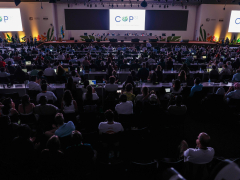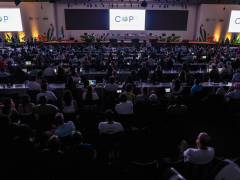The annual United Nations climate conference has ended with an agreement that urges action to address global warming, but falls short of endorsing a phase-out of fossil fuels.
After two weeks of heated debates, meetings and negotiations at the COP30 summit in the Brazilian city of Belem, world leaders on Saturday agreed to a deal that calls for countries to “significantly accelerate and scale up climate action worldwide”.
Recommended Stories
list of 3 items
- list 1 of 3COP30 deal urges more funds for poorer countries, omits fossil fuels
- list 2 of 3UN climate talks go into overtime as divisions over fossil fuels persist
- list 3 of 3COP30 is climate conference “of implementation”
end of list
The text lays out a series of promises and measures – including a call for developed countries to triple their funding to help poorer nations respond to the crisis – but makes no mention of a fossil fuel phase-out.
Dozens of states had been calling forthe COP30 deal to lay out a framework to ease away from their reliance on oil, gas and coal – the major drivers of the climate crisis – but several countries that rely on fossil fuels had pushed back.
While observers say the deal marks a step forward in the world’s effort to address climate breakdown, several have argued that COP30 fell short of expectations.
Here’s a look at how some world leaders and climate advocates have reacted to the agreement.
COP30 President Andre Aranha Correa do Lago
“We know some of you had greater ambitions for some of the issues at hand. I know that you, civil society, will demand us to do more to fight climate change. I want to reaffirm that I will try not to disappoint you during my presidency,” he said during Saturday’s closing session.
“As [Brazilian] President [Luiz Inacio Lula da Silva] said at the opening of this COP, we need roadmaps so that humanity – in a just and planned manner – can overcome its dependence on fossil fuels, halt and reverse deforestation and mobilise resources for these purposes,” he said.
“I, as president of COP30, will therefore create two roadmaps: One on halting and reverting [reversing] deforestation and another to transitioning away from fossil fuels in a just, orderly and equitable manner.”
UN Secretary-General Antonio Guterres
“COP30 has delivered progress,” Guterres said in a statement, including the call to triple climate adaptation financing and recognition that the world is going to surpass the 1.5 degrees Celsius (2.7 degrees Fahrenheit) target for global warming set under the Paris Agreement.
“But COPs are consensus-based – and in a period of geopolitical divides, consensus is ever harder to reach. I cannot pretend that COP30 has delivered everything that is needed. The gap between where we are and what science demands remains dangerously wide,” the UN chief said.
“I understand many may feel dissapointed [sic] – especially young people, Indigenous Peoples and those living through climate chaos. The reality of overshoot is a stark warning: We are approaching dangerous and irreversible tipping points,” he added.

Wopke Hoekstra, European Union climate commissioner
“We’re not going to hide the fact that we would have preferred to have more, to have more ambition on everything,” Hoekstra told reporters.
“It is not perfect, but it is a hugely important step in the right direction.”
Colombian President Gustavo Petro
“I do not accept that the COP30 declaration does not clearly state, as science does, that the cause of the climate crisis is the fossil fuels used by capital. If that is not stated, everything else is hypocrisy,” Petro wrote on social media.
“Life on the planet, including our own, is only possible if we separate ourselves from oil, coal, and natural gas as energy sources; science has determined this, and I am not blind to sci






